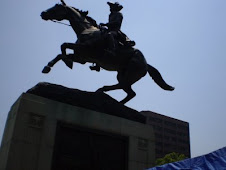skip to main |
skip to sidebar
When I was young we lived in Whitechapel. For my brother and me, there was no nonsense about us being "half English, half Irish" or, worse still, "British-Irish". We were British, and that was that. But others who lived in our corner of Whitechapel in the late 1970s and 1980s had a different idea of what immigration was about. The area was then, and is still, an insular and regressive Muslim ghetto, of the type that exists in towns and cities across Britain.
As part of the post-mortem into the July 7 bombings, everyone is asking how we can confront the threat of extremism among young Muslims. On the streets where I grew up, round the corner from the gigantic East London Mosque, imams are interviewed and young worshippers scrutinised for signs of extremism, while wide-eyed young children beam innocently and disarmingly at the cameras.
The answer, to me, is obvious: now we must really integrate. If we do not, then more areas will come to resemble my part of east London. In recent years gangs of unemployed, disaffected young Bangladeshis and Pakistanis, dressed in fake designer labels, with cropped hair and mobile phones, have been patrolling the streets. Walls display their gang names in graffiti - the Brick Lane Massive, Stepney Green Posse, the Shadwell Crew.
At the annual Brick Lane Festival, which is supposed to celebrate diversity, large groups of militant young Muslims dressed as Hamas supporters march down the street, proclaiming it as their own. It is a thoroughly depressing sight.
[]
Infuriatingly for the tiny white minority watching, these immigrants' access to benefits, healthcare and education did not depend on their learning English, for translators were available on demand.
It is with these memories that I challenge Sir Iqbal Sacranie's insistence that Muslims are trying their hardest to integrate into British society, and that British people must work harder to welcome them.
In an article in this newspaper last December, in which he put his case for the creation of new laws banning the incitement of religious hatred, Sir Iqbal said: "Muslims in Britain do not seek to create an enclave or a parallel culture. They want to be respected as British."
As the child of an immigrant I know how integration works. The onus is on the immigrant, not the residents of the host country, to find work and find his own place. It is not for him to impose his own requirements on to the rest of the population. Hosts do not owe immigrants anything, apart from the acknowledgement of their right, if they have one, to live here. My father and his fellow Irish immigrants would never have dreamt of claiming benefits, speaking in Gaelic or complaining that they weren't being accepted.
Those who believe that racial and religious segregation can be ignored need to wake up. We should have listened to the headteachers who, since the 1970s, have been desperately struggling with the problem of how to educate children who cannot speak English.
More faith schools are manifestly not the answer. If we do not create a properly integrated society in which Muslim immigrants feel at home, at ease and at peace with their fellow Britons and their values, this country could become a breeding ground for far-Right political parties such as those in France, Holland, Austria and Italy. Even worse, if Britain's ghettos are not tackled, they will produce even greater numbers of alienated Muslims, compensating for their alienation in the most fundamental and uncompromising way of all.











No comments:
Post a Comment